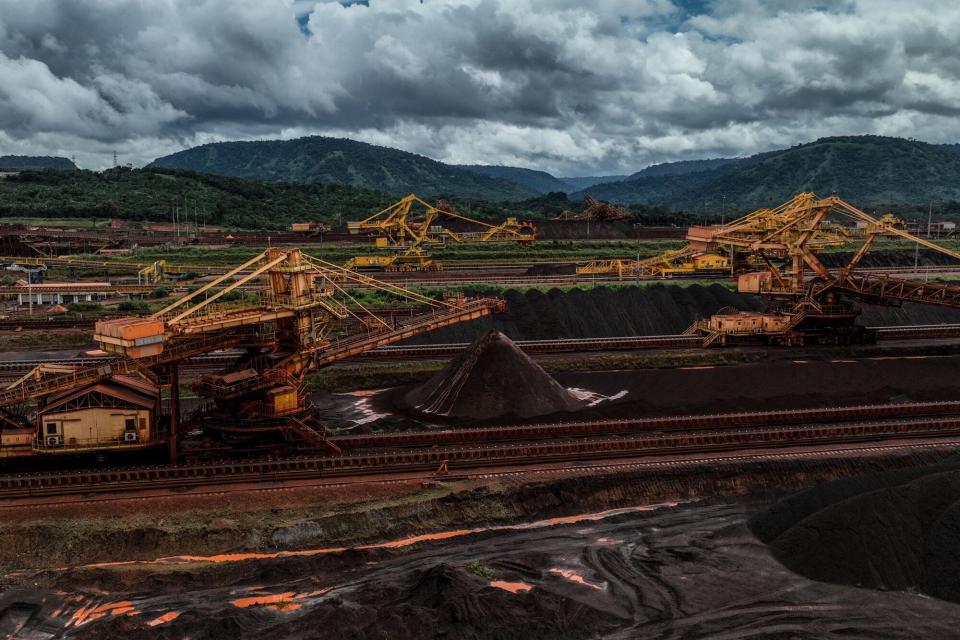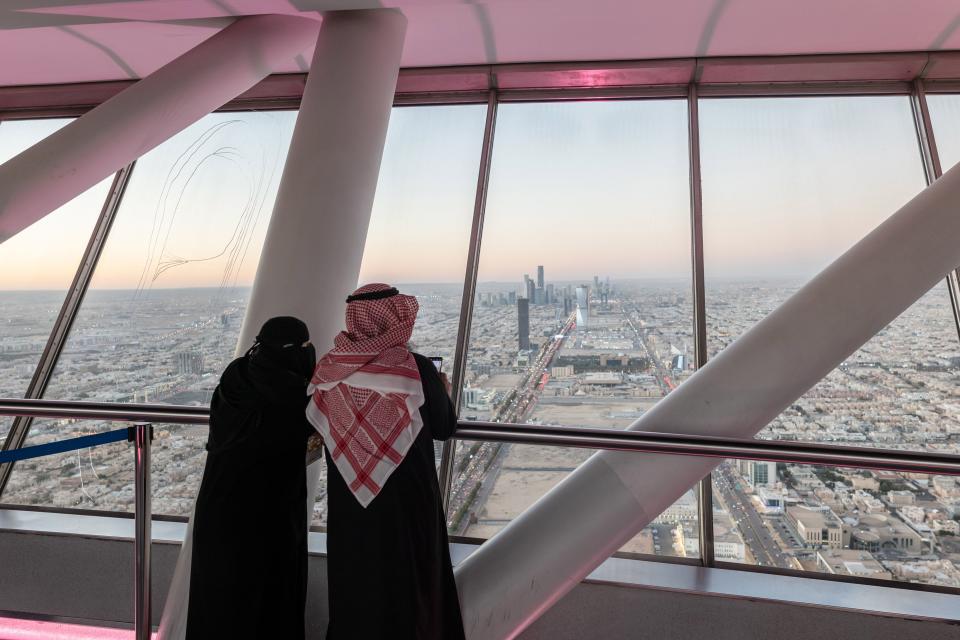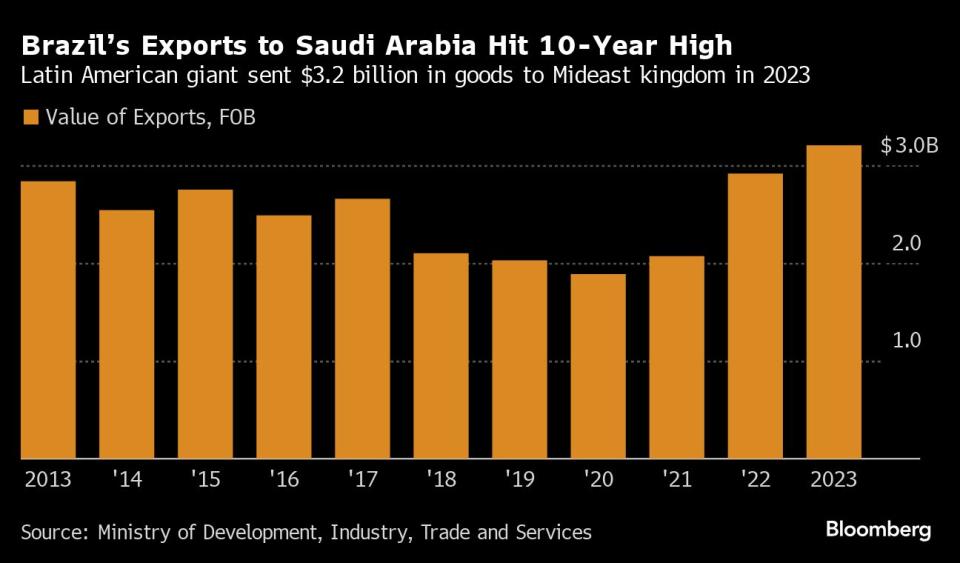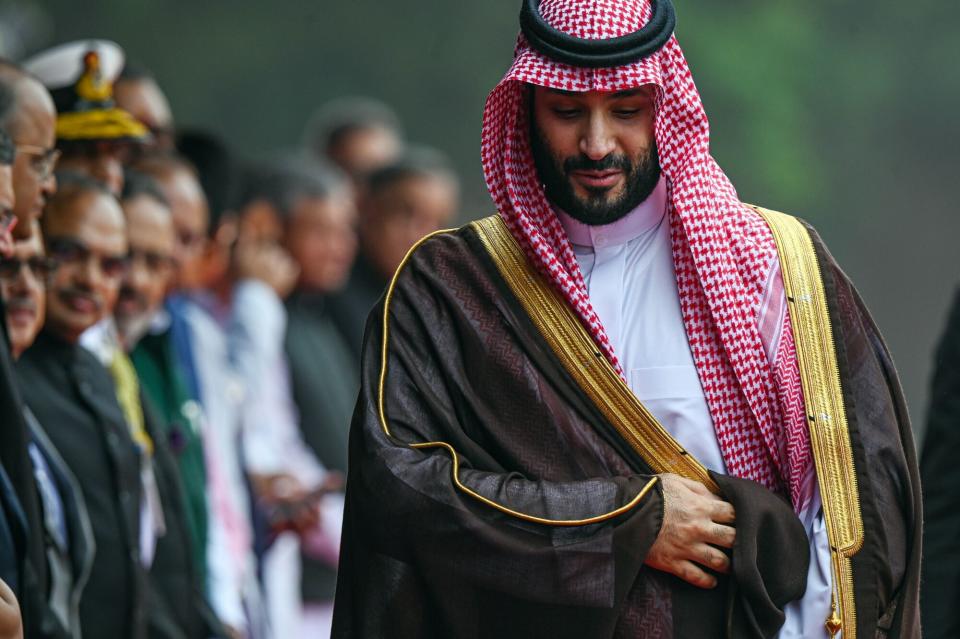Saudis Head to Rio on a Mission to Strengthen Ties With Brazil
(Bloomberg) -- One is a desert kingdom weaning itself off fossil fuels. The other a lush agricultural powerhouse laden with minerals. Saudi Arabia and Brazil are thousands of miles apart, but fate is bringing them closer than ever.
Most Read from Bloomberg
Apple Hits Record After Unveiling ‘AI for the Rest of Us’ Plan
NYC Landlord to Sell Office Building at Roughly 67% Discount
Their relationship started with chicken exports in the 1970s. And now the bond is becoming a way for the Global South heavyweights to diversify their trade ties and insulate their economies from geopolitical risk.
While China and the US are far bigger partners for each, two-way trade between the kingdom and the Latin American giant totaled about $7 billion last year. The Gulf Research Center, a Saudi non-profit, sees that rising to $10 billion by 2030 as the relationship deepens, with Brazil consistently showing it’s willing to give something back to its Arab suitor.
BRF SA, one of the world’s largest poultry suppliers, plans to announce a new plant in Saudi Arabia that will likely see it produce chicken locally for the first time, according to people familiar with the matter. And planemaker Embraer SA has partnered with the kingdom to help develop its aerospace industry.
This week in Rio de Janeiro, an institute backed by the kingdom’s nearly $1 trillion sovereign Public Investment Fund will host its first Latin America-focused investment conference.
The event will bring Brazilian President Luiz Inacio Lula da Silva and Finance Minister Fernando Haddad together with Saudi officials including PIF Governor Yasir Al-Rumayyan. Billionaire Marcelo Claure will also attend along with top executives from companies including miner Vale SA, meat processor JBS SA and digital banking giant Nu Holdings Ltd.
It’s all part of Crown Prince Mohammed bin Salman’s push to spend trillions of dollars on his economic transformation, which aims to turn the oil-rich nation into a hub for everything from tourism to manufacturing, electric vehicles and sports.
Strengthening ties with Brazil “is born of a desire to increase the relevance of the Global South and position it as a counterweight to the traditional dominance by the US and West,” Farouk Soussa, an economist at Goldman Sachs Group Inc., said by phone.
The kingdom is seeking about $100 billion in annual investment from abroad to help realize its economic dream, about three times more than it’s ever achieved. With that money slower to materialize than expected, Saudi Arabia is making a concerted push for foreign money — including allocating about 60% of the shares on offer in Saudi Aramco’s $11.2 billion stock sale to overseas investors.
In the last six weeks, armies of Saudi officials have crossed continents from Asia to North America, seeking to showcase the kingdom as an attractive investment destination. They’ve spent time in New York, Japan and Hong Kong and also played host to a swarm of British delegates in Riyadh.
With the Rio conference, their focus turns to Latin America — and its largest economy. “Brazil has many industries complimentary to Saudi Arabia,” Soussa said. “It can be a key ally in food security and metals.”
Mining is an area of particular interest, as the kingdom says it has more than $1.3 trillion of metals buried within its borders. Saudi-based Manara Minerals Investment Co. recently closed the purchase of a 10% stake in Vale’s base metals unit, worth about $2.5 billion. It marked the kingdom’s first big foray into the global metals space and is likely to be followed with other acquisitions as Manara actively looks to pick up more assets.
For Lula, who is trying to juice economic growth in Brazil through industrial policy, the prospect of increased Saudi investment flows is equally appealing. He visited the kingdom in November, holding talks with MBS — as the crown prince is known — and telling a business audience that within a decade “Brazil will be known as the Saudi Arabia of green energy.”
Food, however, is the backbone of the relationship. Brazil’s exports to Saudi Arabia hit a 10-year high in 2023, with foodstuffs accounting for some 90% of the $3.2 billion total. The kingdom has chosen Brazil as its strategic partner in the sector, largely through PIF and its affiliate, Saudi Agricultural and Livestock Investment Co.
Salic purchased a more than 10% stake in BRF last year. The poultry giant sees potential to use its foothold in the kingdom as a hub for the broader Middle East, said the people, speaking on condition of anonymity to discuss private negotiations.
While producing chicken locally would be more expensive for BRF because of the costs of both corn imports for feed and air conditioning to mitigate the desert climate, higher prices paid for domestically sourced meat and privileged financing conditions would make it worthwhile, one of the people said. Future plans for value-added products may also boost BRF’s profits.
Brazil is the main supplier of food to Organization of Islamic Cooperation countries, having sent $23.4 billion in products last year, beating strong competitors such as the US, Indonesia and Turkey. To ensure that flow continues, Salic also became the largest shareholder in meat producer Minerva SA, with a 30% stake and a supply contract under which the Saudi company could purchase up to 25,000 metric tons a year.
Then there’s fertilizer. State-run Petroleo Brasileiro SA has decided to reenter the market, potentially with an Asian or Middle Eastern partner — with Lula floating the idea of a Saudi partnership during his visit last year. The oil giant confirmed early stage negotiations without giving further details, but speeding up projects in the sector is among Lula’s demands of the company’s new chief executive officer, who will also be at the Rio conference.
On aerospace, Brazil and Saudi Arabia have signed a five-year defense cooperation agreement that includes technology transfer and financing of military systems.
Embraer, meanwhile, has a tentative agreement with the National Industrial Development Center on the adoption of its aircraft in the kingdom. It’s also working to close a deal to sell 33 aircraft to Saudi Arabia and is weighing a potential new production center in the region, Folha de S. Paulo newspaper reported this month.
The crown prince’s transformation plan — known as Vision 2030 — means that in addition help on food security, aerospace and mining, the kingdom is keen to attract Brazilian technology, capital and manpower to fill deficits in infrastructure, hospitality, housing, entertainment and more, according BTG Pactual SA, which has opened an office in Riyadh.
“It’s a country of 36 million people with real problems to solve,” said Adriano Borges, a partner at the bank responsible for Middle East investment strategy.
There’s a broader investment push as well. A firm backed by Claure, a former SoftBank Group Corp. executive, is in talks with Saudi investors to launch a $600 million fund as it targets Brazil’s climate and energy sectors. And Patria Investments Ltd., one of the largest alternative asset managers in Latin America, is working with its portfolio companies to boost investment into kingdom too.
“It’s not just us receiving capital as Brazil, or as Patria as an asset manager, but an exchange of capital,” Patria CEO Alexandre Saigh said Monday in a phone interview.
For now, Saudi Arabia is investing more in Brazil than the other way around. The Latin American giant took in $1 billion from the kingdom in 2022 while investing just $300 million there, according to the Arab-Brazilian Chamber of Commerce.
“In the longer term, we might see more Brazil FDI going into the kingdom,” said Hannan Alghamdi, who studies regional relations with Latin America at the Gulf Research Center. “There’s interest and potential but I don’t think it will be happening for another few years”
--With assistance from Rachel Gamarski, Matthew Martin and Samy Adghirni.
Most Read from Bloomberg Businessweek
As Banking Moves Online, Branch Design Takes Cues From Starbucks
Food Companies Hope You Won’t Notice Shortages Are Raising Prices
Legacy Airlines Are Thriving With Ultracheap Fares, Crushing Budget Carriers
Sam Altman Was Bending the World to His Will Long Before OpenAI
©2024 Bloomberg L.P.

 Yahoo Finance
Yahoo Finance 



